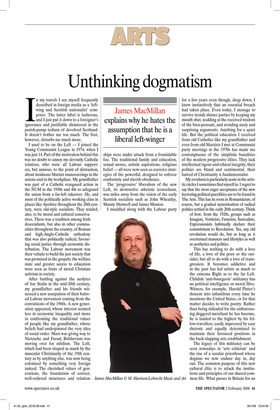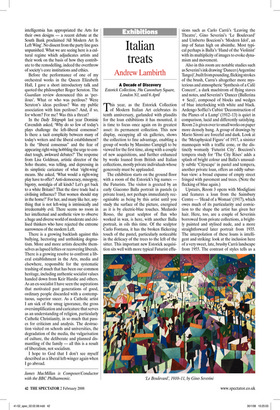Unthinking dogmatism
James MacMillan explains why he hates the assumption that he is a liberal left-winger
In my travels I see myself frequently described in foreign media as a ‘leftwing and Scottish nationalist’ composer. The latter label is ludicrous, and I just put it down to a foreigner’s ignorance and justifiable disinterest in the parish-pump tedium of devolved Scotland. It doesn’t bother me too much. The first, however, disturbs me much more.
I used to be on the Left — I joined the Young Communist League in 1974, when I was just 14. Part of the motivation behind this was no doubt to annoy my devoutly Catholic relatives, who were all Labour supporters, but anxious, to the point of distraction, about insiduous Marxist manoeuvrings in the unions and in the workplace. My grandfather was part of a Catholic rearguard action in the NUM in the 1930s and 40s to safeguard the union from a far-left takeover. He, and most of the politically active working class in places like Ayrshire throughout the 20th century, were old-style socialists. They tended, also, to be moral and cultural conservatives. There was a tradition among Irish descendants, but also in other communities throughout the country, of Roman and high-Anglo-Catholic orthodoxy that was also politically radical, favouring social justice through economic distribution. The Labour movement was their vehicle to build the just society that was promised in the gospels; the welfare state and greater access to education were seen as fruits of moral Christian activism in society.
After battling against the acolytes of Joe Stalin in the mid-20th century, my grandfather and his friends witnessed a new usurpation of their beloved Labour movement coming from the convulsions of the 1960s. A new generation appeared, whose interest seemed less in economic inequality and more in confronting the traditional values of people like my grandfather, whose beliefs had underpinned the very idea of social order. Marx was giving way to Nietzsche and Freud; Bolshevism was moving over for nihilism. The Left, which had been shaped as much by the muscular Christianity of the 19th century as by anything else, was now being colonised by something very foreign indeed. The cherished values of generations, the foundation of correct, well-ordered structures and relation ships were under attack from a formidable foe. The traditional family and education, sexual mores, artistic aspirations, religious belief — all were now seen as coercive strategies of the powerful, designed to enforce conformity and slavish obedience.
The ‘progressive’ liberalism of the new Left, its destructive atheistic iconoclasm, was miles away from the vision of the early Scottish socialists such as John Wheatley, Manny Shinwell and James Maxton.
I muddled along with the Labour party for a few years even though, deep down, I knew instinctively that an essential breach had taken place. Even today, I manage to survive trendy dinner parties by keeping my mouth shut, nodding at the received wisdom of the bien-pensant, and avoiding nasty and surprising arguments. Anything for a quiet life. But the political education I received from old Catholics like my grandfather and even from old Marxists I met at Communist party meetings in the 1970s has made me contemptuous of the simplistic banalities of the modern progressive élites. They lack intellectual rigour and ethical integrity, their politics are bland and sentimental, their hatred of Christianity is fundamentalist.
My revulsion is particularly acute in the artistic circles I sometimes find myself in. I regret to say that the most eager acceptance of the new hectoring political puerilities are to be found in The Arts. This has its roots in Romanticism, of course, but a gradual systemisation of radical politics settled in the early 20th century. Think of how, from the 1920s, groups such as Imagists, Vorticists, Futurists, Surrealists, Expressionists habitually declare their commitment to Revolution. Yes, any old revolution would do, but as long as it overturned manners and lifestyles as well as aesthetics and politics.
This has nothing to do with a love of life, a love of the poor or the outsider, but all to do with a love of transgression. It becomes addictive and in the past has led artists as much to the extreme Right as to the far Left. Childish ‘anti-bourgeois’ militancy has no political intelligence or moral fibre. Witness, for example, Harold Pinter’s descent into infantilism every time he mentions the United States, or for that matter decides to write poetry. Rather than being ridiculed for the embarrassing doggerel-merchant he has become, he is lauded to the highest by his fellow-travellers, easily impressed by easy rhetoric and equally determined to maintain their favoured positions in the back-slapping arts establishment.
The legacy of this militancy can be seen nowadays in ‘arts criticism’ and the rise of a secular priesthood whose dogmas we now endure day in, day out. The common purpose of this new cultural élite is to attack the institutions and principles of our shared common life. What passes in Britain for an intelligentsia has appropriated the Arts for their own designs — a recent debate at the South Bank proclaimed ‘All Modern Art Is Left Wing’. No dissent from the party line goes unpunished. What we are seeing here is a cultural regime which adjudicates artists and their work on the basis of how they contribute to the remodelling, indeed the overthrow of society’s core institutions and ethics.
Before the performance of one of my orchestral works in the Queen Elizabeth Hall, I gave a short introductory talk and quoted the philosopher Roger Scruton. The Guardian review denounced this as ‘perilous’. What or who was perilous? Were Scruton’s ideas perilous? Was my public association with him perilous? And, if so, for whom? For me? Was this a threat?
In the Daily Telegraph last year Dominic Cavendish asked, ‘Why do so few of today’s plays challenge the left–liberal consensus? Is there a tacit complicity between many of today’s writers and the liberal establishment? Is the “liberal consensus” and the fear of appearing right-wing hobbling the urge to conduct tough, awkward debates?’ The response from Lisa Goldman, artistic director of the Soho theatre, was telling, and depressing in its simplistic caricature of what ‘right-wing’ means. She asked, ‘What would a right-wing play have to offer? Anti-democracy, misogyny, bigotry, nostalgia of all kinds? Let’s get back to a white Britain? That the slave trade had a civilising influence? That women should stay in the home?’ For her, and many like her, anything that is not left-wing is intrinsically and irredeemably evil. There seems no room in her intellectual and aesthetic view to observe a huge and diverse world of moderate and civilised thinkers who have rejected the extreme narrowness of the modern Left.
There is a growing backlash against this bullying, hectoring and unthinking dogmatism. More and more artists describe themselves as lapsed lefties or recovering liberals. There is a growing resolve to confront a liberal establishment in the Arts, media and elsewhere, responsible for the systematic trashing of much that has been our common heritage, including authentic socialist values handed down from Keir Hardie and others. As an ex-socialist I have seen the aspirations that motivated past generations of good, ordinary people discarded with a contemptuous, superior sneer. As a Catholic artist I am sick of the smug ignorance, the gross oversimplification and caricature that serves as an understanding of religion, particularly Catholic Christianity, in so much that passes for criticism and analysis. The destruction visited on schools and universities, the degradation of the media, the vulgarisation of culture, the deliberate and planned dismantling of the family — all this is a result of liberalism, not socialism.
I hope to God that I don’t see myself described as a liberal left-winger again when I go abroad.
James MacMillan is Composer/Conductor with the BBC Philharmonic.



































































 Previous page
Previous page